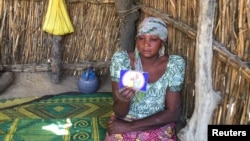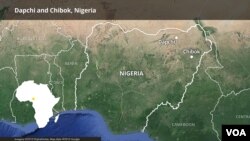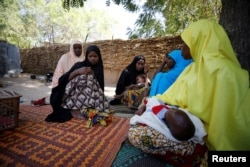Yakubu Nkeki knows just what to say when he meets the parents of 110 Nigerian schoolgirls kidnapped by suspected Boko Haram militants in the northeastern town of Dapchi last month.
His daughter was among 220 Chibok girls abducted by the insurgents in 2014, which put Nigeria's nine-year-old conflict with Boko Haram into the global spotlight, sparking a global outcry and the viral online campaign #BringBackOurGirls.
"We will tell them to exercise patience," Nkeki told the Thomson Reuters Foundation by phone, ahead of a trip by about 30 Chibok parents to Dapchi, as it reels from the highest-profile mass abduction since the Chibok kidnapping.
President Muhammadu Buhari called the February 19 attack a "national disaster" and said the government would not rest until the last girl had been found and released.
The parents set off Tuesday morning on a six-hour drive through narrow country roads to offer advice and condolences to grieving families in Dapchi, 275 kilometers (171 miles) northwest.
"When it happened to us, some parents refused to eat, crying day and night for almost a year," said Nkeki, chairman of a Chibok parents association.
"Due to the trauma, 18 parents have died. We don't want them to go through that."
Negotiations planned
Nkeki's daughter, Maimuna, was among 21 girls released after almost three years in captivity, following negotiations between the Nigerian government and Boko Haram. More than 100 Chibok girls have been freed, found or rescued by the military.
Nigeria's presidency has said that it plans to negotiate for the release of the 110 Dapchi girls.
"We will comfort them and tell them that they should be patient and wait as we, too, still wait," said Yana Galang, one of 10 Chibok mothers headed to Dapchi, whose daughter, Rifkatu, is among more than 100 Chibok girls still in Boko Haram captivity.
The Dapchi parents hope their visitors will advise them about how to advocate for their daughters' release.
"We are new to the system. Maybe they will guide us on how to confront the government, from local to the federal level up to the international level," said Kachalla Bukar, secretary of a Dapchi parents association.
"They can also show us how to work with any other person that will help us," added the farmer, 46, whose 14-year-old daughter, Aisha, is missing.
The parents of the Dapchi schoolgirls have said that they hope the #BringBackOurGirls campaign can help to secure their daughters' release.







